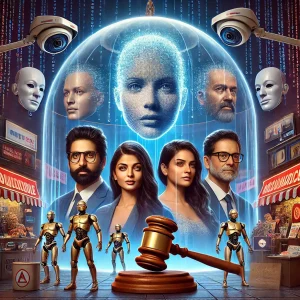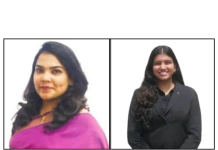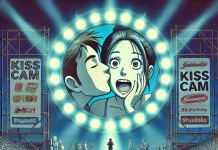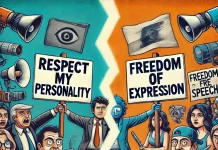Introduction:
In recent years, a steady stream of celebrities have turned to the courts to safeguard their public image. From Amitabh Bachchan, who secured sweeping protection over his name, voice, and likeness, to Jackie Shroff, Rajinikanth, and Anil Kapoor, who even succeeded in stopping the misuse of his iconic “jhakaas” catchphrase, the list keeps growing. Most recently, actress Aishwarya Rai Bachchan, actor Abhishek Bachchan, filmmaker Karan Johar, actor Nagarjuna, and spiritual teacher Ravi Shankar of Art of Living have all obtained injunctions from the Delhi High Court, and singer Asha Bhosle from the Bombay High Court, to curb the circulation of AI-generated content, counterfeit merchandise, and other unauthorised uses of their likeness.
These actions highlight how personality rights serve as a crucial shield against the unauthorised appropriation of a person’s identity. Such rights are not limited to a name or a photograph and extend to attributes like voice, image, distinctive style, and other elements that form an individual’s unique “persona”. In today’s digital landscape where deepfakes, generative Artificial Intelligence (“AI”) and viral media make replication effortless, the risk of misappropriation has grown significantly. Whether it is a celebrity’s face being digitally manipulated into misleading videos or their image printed on merchandise without consent, the need for swift judicial protection has never been more pressing.
“Personality Rights” according to the Court of Law:
Under Section 2(qq) of the Indian Copyright Act, 1957, actors are recognized as performers and are therefore entitled to performers’ rights, which include economic, moral, and non-tangible rights. These non-tangible rights cover aspects such as control over their persona and protection against the unauthorized use of their name, image, or likeness. A person’s personality is, after all, the very means by which they are identified and distinguished from others. In today’s digital age, manipulated images of celebrities can easily be exploited for commercial gain or used in ways that harm their reputation. The Madras High Court, in Shivaji Rao Gaikwad v. Varsha Productions[i] affirmed that the right to personality rests with individuals who have achieved celebrity status. The court clarified that any unauthorized use of a celebrity’s persona does not require proof of deception, as long as the person is clearly identifiable.
John Doe Orders:
John Doe is a generic term used to classify persons whose identities are unknown to the public at large. They are temporary ex parte injunctions obtained by copyright owners to restrain unidentified infringers. These orders prohibit ongoing or potential infringing activities by unknown parties and also help prevent any likely future infringements.
The order thus serves as a protective shield, offering a pre-emptive and swift remedy to copyright owners. Ordinarily, under Order 7 of the Code of Civil Procedure (“CPC”), it is necessary to specify the defendant’s name and address. However, where such identification is impossible, courts have permitted the use of John Doe orders. In the context of Bollywood film copyright protection, these actions are generally initiated under Order 39 Rules 1 and 2 read with Section 151 of CPC.
Aishwarya Rai Bachchan:
On 9 September 2025, the Delhi High Court[ii] passed a detailed interim order protecting actor Aishwarya Rai Bachchan from an array of online misuses of her name and image. Justice Tejas Karia granted urgent ex parte relief after being shown extensive evidence of websites, e-commerce sellers and AI-driven platforms illegally profiting from her persona.
A former Miss World, acclaimed actress and global brand ambassador, Aishwarya Rai Bachchan, filed a commercial suit seeking to restrain the unauthorised use of her name, likeness, voice and other attributes of her personality. Her complaint named a mix of defendants, including websites falsely claiming to be her “official” page, platforms distributing apps or merchandise carrying her image, an organisation using her photograph to lend legitimacy to its activities, a chatbot making sexually coloured remarks while impersonating her, and YouTube channels circulating AI-generated “deepfake” videos and shorts placing her in fabricated or obscene scenarios. Google Incorporation (as owner of YouTube) and the Indian government’s Information & Technology ministries were added as pro-forma parties to ensure swift takedown of infringing links. Unknown infringers were also sued as “John Does” to capture any unidentified offenders.
The counsel for the actress stressed that her name and likeness enjoy immense goodwill and commercial value. Any unauthorised use misleads the public into believing a false association and directly harms her reputation and contractual endorsements. He highlighted the dangers posed by AI tool such as deepfakes, face morphing, generative content which have the potential to create realistic but fabricated images and conversations.
Given the clear evidence of infringement and the risk of irreparable harm, the Court found a strong prima facie case in Rai Bachchan’s favour and held that the balance of convenience lay with her.
Interim Directions:
The Court issued sweeping injunctive relief, restraining all defendants, including unnamed John Does from:
- using Aishwarya Rai Bachchan’s name, acronym “ARB”, image, likeness or any other identifiable attribute without her consent;
- exploiting these attributes through any technology, including AI, deepfakes or face morphing; and
- selling or disseminating merchandise or digital content bearing her persona.
- Platforms such as Google/YouTube and e-commerce sites were ordered to take down specific URLs within 72 hours and to provide subscriber information of infringers in sealed cover.
- Government departments were directed to assist in blocking offending links.
Abhishek Bachchan:
Further, on 10 September 2025, the Delhi High Court[iii] granted a similar strong interim protection to actor Abhishek Bachchan. The Court directed several websites, e-commerce platforms and YouTube channels to stop using his name, likeness and other personal attributes without consent. The order came after the court was shown extensive evidence of online misuse of the actor’s identity that included unauthorised merchandise and AI-generated videos containing explicit content.
The actor highlighted that his name, image and likeness are valuable commercial assets in addition to being personal attributes. He explained that he carefully chooses which brands he endorses and that unauthorised use of his persona misleads the public, harms his reputation and may conflict with existing endorsement agreements. He further pointed out the unique dangers posed by AI, which allows the creation and rapid spread of convincing but false content.
The suit described how different parties were selling T-shirts, mugs, posters and stickers displaying his name, signature and photograph. Some websites offered downloadable wallpapers carrying his images and earned advertising and subscription revenue from these downloads. Several YouTube channels had uploaded AI-generated videos that placed him in fabricated situations, some of which contained inappropriate or sexually suggestive material.
Google LLC as the owner of YouTube, and two government ministries were included as parties to facilitate the removal of infringing content. Unknown offenders were also added as “John Doe” defendants to cover entities whose identities could not yet be ascertained.
Interim Directions:
The Court issued sweeping injunctive relief, restraining all defendants, including unnamed John Does from:
- using Abhishek Bachchan’s name, acronym “AB”, image, likeness, voice, signature or any other identifiable attribute without his consent;
- exploiting these attributes through any technology, including AI, deepfakes or face morphing; and
- selling or disseminating merchandise or digital content bearing his persona, and further exploiting his personality;
- Platforms such as Google/YouTube and e-commerce sites were ordered to take down specific URLs within 72 hours and to provide subscriber information of infringers in sealed cover.
- Government departments were directed to assist in blocking offending links.
Karan Johar:
These significant judgments in the ambit of personality rights cases were followed by acclaimed filmmaker, Karan Johar[1], who sought protection of his personality rights before the Delhi High Court. Read order here.
Johar sought an injunction against unknown persons (John Doe / Ashok Kumar) using AI and deepfakes to create morphed images of the film maker in bad taste, fake social media profiles, derogatory memes, as well as activities being undertaken through sale of merchandise using his personality rights. A reference was provided to an earlier precedent this year, in Karan Johar vs. India Pride Advisory Private Ltd. and Others[2], wherein the Hon’ble Bombay High Court recognized the personality rights of Karan Johar and granted him interim protection in respect of the same.
The Court reaffirmed that a celebrity’s name, voice, image, likeness, and unique attributes are proprietary rights that deserve protection. These fall within the “right of publicity” under common law, Copyright Act, 1957 and Trademarks Act, 1999.
In the Karan Johar order, two specific elements of Johar’s persona received particular attention, his nickname “KJo” and his catchphrase “toodles.”
Johar argued that both have acquired secondary meaning in the public imagination and function as distinctive markers of his personality. The plaint described “KJo” as an abbreviation by which he is “immediately associated” and “toodles” as a signature way of saying goodbye which is so closely linked with his brand that unauthorized use could create confusion, mislead consumers, and dilute his commercial value. While “KJo” was affirmed by the Court, the issue on the term “toodles” was reserved to be considered on the next date of hearing, i.e., 19th February 2026. This treatment parallels the Delhi High Court’s reasoning in Anil Kapoor v. Simply Life India[3], where the Court granted interim protection to Kapoor’s distinctive attributes—including his youthful image, likeness, and the iconic exclamation “jhakaas.”
Akkineni Nagarjuna:
On 25 September 2025,[4] the Delhi High Court granted sweeping interim relief to veteran actor Akkineni Nagarjuna, restraining websites, e-commerce platforms, domain name registrars, and John Doe defendants from misappropriating his personality rights. The suit was triggered after multiple pornographic websites and merchandise sellers were found exploiting Nagarjuna’s name, images, and persona without consent.
The actor, represented by senior counsel, argued that his name and likeness were built over four decades and recognized widely across Indian cinema and therefore enjoys immense goodwill and are uniquely associated with him. Unauthorized use, particularly in pornographic settings, not only has diluted his reputation but has also caused confusion regarding false affiliation and endorsement.
The defendants, including multiple websites, domain name registrars, merchandise sellers, and unnamed “John Doe” parties, were restrained from using Nagarjuna’s name, image, likeness, voice, or any identifiable attributes of his persona without consent. The order specifically prohibited exploitation through technological means such as artificial intelligence, generative AI, deepfakes, and face morphing.
Sri Sri Ravi Shankar:
On 26 August 2025, the Delhi High Court, in Ravi Shankar v. John Doe(s)/Ashok Kumar(s) & Ors., passed a detailed ex parte ad-interim injunction protecting the personality rights of globally renowned spiritual leader and humanitarian Sri Sri Ravi Shankar. The Court granted relief after being presented with evidence that multiple websites and social media pages were circulating deepfake videos digitally impersonating him. These videos, created using AI-based voice cloning and facial manipulation tools, falsely portrayed him as endorsing Ayurvedic remedies for serious ailments such as diabetes and haemorrhoids, thereby misleading the public and damaging his reputation.
The Court recognized that Sri Sri Ravi Shankar’s name, voice, image, likeness, and unique manner of speech are integral to his personality and publicity rights under Articles 19(1)(a) and 21 of the Constitution. It observed that such attributes constitute valuable intangible assets deserving judicial protection. Finding a strong prima facie case in his favour, the Court restrained all defendants, including unidentified “John Doe” entities, from using or exploiting his persona in any form, particularly through AI-generated, deepfake, or voice-cloned content without authorization.
The Court further directed social media platforms like Facebook and domain name registrars to disable access to the infringing content within 36 hours, lock and suspend offending domains, and disclose the identities and IP details of the persons responsible. Government authorities were also directed to ensure blocking of the websites involved. This order marks another decisive step in the judiciary’s evolving recognition of personality rights in the digital and AI era, underscoring that even spiritual figures enjoy protection from technological misappropriation of their identity.
Asha Bhosle:
On 29 September 2025[iv], the Bombay High Court granted temporary protection to legendary playback singer Asha Bhosle in her plea against AI platforms and online intermediaries misappropriating her personality rights. The suit arose from allegations that two U.S.-based AI platforms were unlawfully creating and disseminating voice models that replicated her distinctive vocal style and arrangements, allowing users to generate songs in her likeness. She also highlighted unauthorised exploitation of her name, image, and photographs on online merchandise and digital platforms.
The Court noted that Bhosle’s reputation and goodwill, built over decades as one of India’s most celebrated playback singers, are entitled to protection both as commercial assets and as extensions of her moral rights and dignity. Recognising the potential harm posed by generative AI and deepfake technology, the Court passed an ad-interim injunction restraining the defendants, including unknown “John Doe” infringers from using her name, image, likeness, voice, mannerisms, or any other attributes of her persona without consent.
The matter has been kept for further hearing on 13 October 2025 but the interim relief ensures immediate protection of the singer’s identity and reputation pending trial.
Read order here.
Conclusion:
The Delhi and Bombay High Court’s recent orders in relation to the film industry personalities and artists, together marks a decisive moment in the evolution of personality rights and the right of publicity in India. Across all the matters, the Court recognised that a singer/celebrity’s name, image, likeness, voice, signature, performance, and other indicia of identity are not only extensions of their personal dignity but also valuable commercial assets.
Building upon key precedents such as Amitabh Bachchan v. Rajat Nagi[5], Anil Kapoor v. Simply Life India (supra), and Jaikishan Kakubhai Saraf v. Peppy Store[6], the Court reaffirmed that free speech and fair comment cannot be stretched to permit commercial misappropriation or tarnishment of reputation. It emphasised that technological tools like AI and Generative AI, while innovative, cannot serve as shields for infringing conduct.
These recent judgments, read together, creates a strong body of jurisprudence signalling that the right of publicity is firmly embedded within Indian civil law, protecting not only commercial value but also the constitutional rights of reputation, privacy and dignity.
[1] CS (COMM) 974/2025
[2] COMM IPR SUIT (L) NO. 17863/2024
[3] 2023 SCC OnLine Del 6914
[4] CS (COMM) 1023/2025
[5] ((2022) 6 HCC (Del) 641)
[6] (2024) 2 HCC (Del) 253
[i] 2015 (62) PTC 351 (Madras)
[ii] CS (COMM) 956/2025
[iii] CS (COMM) 960/2025
[iv] COMIP/30262/2025
Image generated on Dall-E












